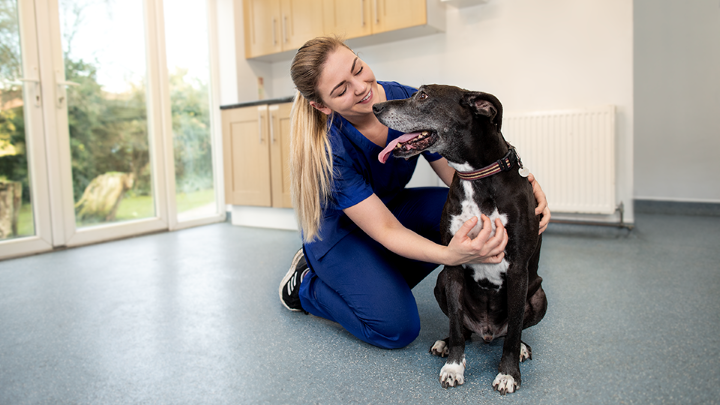Dog And Puppy Microchipping
Microchipping is the best way to make sure your dog is safely returned to you if they ever go missing. You’re legally required to get them microchipped by the time they’re eight weeks old and Medivet can guide you through the process. We include microchipping as part of all our healthcare plans so read on to discover how we can help protect your dog and give you peace of mind.

What is a microchip?
Microchips are used everywhere – in your phone, computer, car, microwave and many other electronic devices – to hold and process data. Dog microchips have a unique identification number which links to a registered database containing your ownership and contact details. They’re about the size of a grain of rice and are inserted under your dog’s skin, usually between the shoulder blades. They won’t feel it once it’s in, but it means if ever your dog goes missing, they can quickly be scanned, identified and reunited with you.
Why do dogs need to be microchipped?
Since April 2016, all dogs must be microchipped and owners are legally required to keep their details up to date.
It’s also a legal requirement for all breeders to microchip and register their own details to a puppy before they’re sold. Once you’ve picked up your new puppy, you’ll need to apply for a transfer of keepership and register their microchip to your details. You’ll need to contact the microchip database to do this. Remember, it’s against the law for your breeder to offer to microchip and register it directly to your name.
If your dog is over the age of eight weeks and isn’t microchipped, or if your details aren’t up to date on the database, you could face a fine of up to £500.
Benefits and importance of microchipping
Microchipping is not only a legal requirement but one of the best ways to ensure your dog is returned to you safely if they ever go missing. As much as we hope this doesn’t happen it is important to be prepared.
Unlike collars or tags which can break or be removed, microchipping is a permanent form of identification. If your missing dog is found and taken to a vet or shelter they can be scanned and quickly reunited with you. Chipping can also help in cases of dog theft or disputed ownership.
Similarly, if your pet is found injured with no visible identification, a vet can scan the chip and quickly access your contact information . And if you want to travel abroad with your dog all countries will insist on them being microchipped.
 What does microchipping cost?
What does microchipping cost?
Microchipping is a simple, affordable, one-time procedure which will keep your dog safe for their entire lifetime. Costs will vary from clinic to clinic but is typically between £10 and £30. At Medivet, we include microchipping as standard in all our healthcare plans.
Microchipping aftercare
How do I change my dog’s microchip details?
It’s essential you keep your details up to date if you change your phone number or email, or move home. If you sell your pet, you must also update the chip with the new owner’s details.
To update your details, you’ll need your dog’s unique ID number which should be on the original paperwork. If you don’t have it your vet will be able to scan them and give it to you. You’ll need to phone the registered database or log in online. Some registries may charge a small fee to update the details while others offer the service for free. Double check the details are correct and you’re all set.
Where can dogs be microchipped
Your vet or nurse will be happy to microchip your dog.. At Medivet, microchipping is part of both our standard and extra dog healthcare plans, making it simple and cost-effective to keep your pet healthy and safe.

Is microchipping safe for my dog?
Yes, it’s a very safe and virtually painless procedure. Complications are extremely rare and the actual insertion causes no more discomfort than if they were getting a regular vaccination or injection. Most dogs don’t even notice getting it done.
Is it my responsibility to microchip my dog?
If you’re buying a puppy it’s down to the breeder to get them microchipped before they go to their new home. But once you bring your new family member home it’s important to transfer the keepership to yourself. If you buy or adopt an older dog you’ll also need to get their identification details transferred to you. If they haven’t been microchipped, then you’ll need to get it done.
Is there a GPS tracking chip for dogs?
Unfortunately, it’s not possible to have a GPS tracker implant for a couple of reasons. Firstly, the size of even the smallest GPS tracker is too large to be implanted under the skin. Secondly, most GPS trackers have an integrated battery which not only needs regular charging but could also cause health risks if embedded into your pet.
You can, however, invest in a GPS tracker which clips to your dog’s collar. Although they can be costly and need regular charging, they allow you to track their location. It’s important to remember that these GPS trackers aren’t a substitute for an up-to-date microchip.

Our Healthcare Plans For Your Dog
With the Medivet Healthcare Plan, you can save an average of £285 each year and that’s without discounts that the plan offers on top.
Learn moreRelated Articles

About Blue-Green Algae Poisoning
Blue-green algae can be highly toxic to pets, causing fatal liver damage and long-term health conditions. Read about how to protect your pet this summer.
Read article
The Responsible Dog Owner's Guide
Owning a dog is a huge commitment. Refresh your knowledge of responsible dog ownership with our complete guide.
Read article
Flea Advice For Dogs
Regular flea prevention is an essential part of any dog’s care routine. Find out how to protect your dog and keep your home flea-free.
Read article

